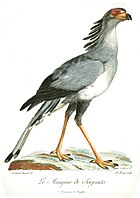
The osprey, historically known as sea hawk, river hawk, and fish hawk, is a diurnal, fish-eating bird of prey with a cosmopolitan range. It is a large raptor, reaching more than 60 cm (24 in) in length and 180 cm (71 in) across the wings. It is brown on the upperparts and predominantly greyish on the head and underparts.

The red-rumped parrot, also known as the red-backed parrot or grass parrot, is a medium-sized broad-tailed parrot endemic to open woodland in south-eastern Australia, particularly in the Murray-Darling Basin. It is a highly sexually dimorphic species, with the adult female mainly being a greyish olive-green with lighter underparts and the adult male predominantly being a brightly coloured green and gold with various shades of blue on the wings. Only the adult male possesses the red rump that gives the species its common name.

The black-fronted dotterel is a small plover in the family Charadriidae that is found throughout much of Australia and New Zealand.
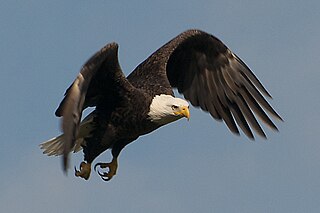
A sea eagle or fish eagle is any of the birds of prey in the subfamily Haliaeetinae of the bird of prey family Accipitridae. Ten extant species exist, currently described with this label.
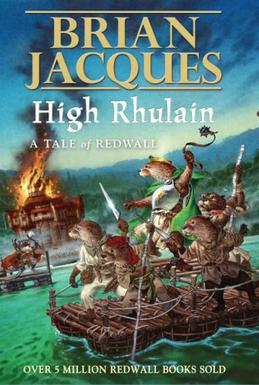
High Rhulain is a children's fantasy novel by Brian Jacques, published in 2005. It is the 18th book in the Redwall series.

The saw-wings, Psalidoprocne, is a small genus of passerine birds in the swallow family. The common name of this group is derived from the rough outer edge of the outer primary feather on the wing, which is rough due to recurved barbs. The function of this is unknown. The birds are 11–17 cm long and black or black-and-white in colour. The genus has an African distribution and all species can be found foraging over forest and woodland. The last part of their scientific name comes from the eldest daughter of King Pandion of Athens, Procne, who was turned into a swallow after tricking her abusive husband.
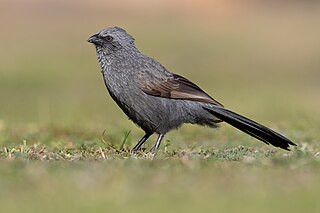
The apostlebird, also known as the grey jumper, lousy jack or happy family, is a quick-moving, gray or black bird about 33 cm (13 in) long. It is a native to Australia where it roams woodlands, eating insects and seeds at, or near, ground level. Apostlebirds often travel in groups of about 12; for this reason, they were named after the 12 Biblical apostles.
An osprey is a medium-large fish-eating bird of prey. There are two species:

The regent parrot or rock pebbler is a bird found in southern Australia. It has predominantly yellow plumage with a green tail. The bird is found primarily in eucalyptus groves and other wooded areas of subtropical southwestern Australia, as well as in a smaller area of subtropical and temperate southeastern Australia. Seeds make up the bulk of its diet.

The Australian bustard is a large ground-dwelling bird that is common in grassland, woodland and open agricultural country across northern Australia and southern New Guinea. It stands at about one metre high, and its wingspan is around twice that length. The species is nomadic, flying to areas when food becomes plentiful, and capable of travelling long distances. They were once widespread and common to the open plains of Australia, but became rare in regions that have been used for farming. The bustard is omnivorous, mostly consuming the fruit or seed of plants, but also eating invertebrates such as crickets, grasshoppers, smaller mammals, birds and reptiles.

Mount Henry Peninsula is a land feature and reserve located 11 km (6.8 mi) south of Perth, Western Australia, on the north bank of the Canning River near the Mount Henry Bridge in Salter Point, Western Australia. It covers 11.9 hectares, and includes both Banksia attenuata and Banksia menziesii woodland, and a muddy and desert biome. The peninsula features limestone slopes, shoreline vegetation, wetlands, and contains the most inland vegetated knoll of the Spearwood dunes on the Swan-Canning estuary, as well as a significant variety of natural conditions for birds and other fauna. The Mount Henry Peninisula is a designated Bush Forever Site, number 227.

The black-breasted buzzard is a large raptor endemic to mainland Australia. First described by John Gould in 1841, it forms part of the family Accipitridae and is most closely related to the square-tailed kite. It is a versatile hunter known for its special skill in cracking eggs. The species is common throughout most of its range.

The star finch is a seed-eating bird species found in northern Australia. It has a distinctive red face and bill, and broad white spots down its flanks. One of its three subspecies may be extinct.

The Australian logrunner is a species of bird that is endemic to eastern Australia where it uses unique foraging techniques and adaptations to search for its food on the floors of temperate, subtropical, or tropical moist lowland forests in south-eastern Australia. Until 2002, it was widely considered to be conspecific with the New Guinea logrunner, but studies showed the two differ significantly, both genetically and vocally.
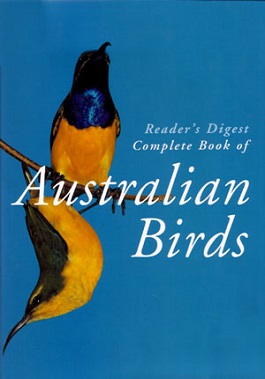
The Reader's Digest Complete Book of Australian Birds is a book first published by Reader's Digest Services Pty Ltd of Sydney, Australia in 1976 and reprinted several times, with a completely revised edition issued in 1986.

The Nullarbor quail-thrush is a species of bird in the family Cinclosomatidae. It is the only Australian bird endemic to the Nullarbor Plain in southern Australia.
Cape Blanche Conservation Park is a protected area located on the west coast of Eyre Peninsula in South Australia about 25 kilometres south of Streaky Bay. It was proclaimed under the National Parks and Wildlife Act 1972 in 2012 for the purpose of protecting ‘important breeding habitat for the eastern osprey and white-bellied sea-eagle ’ and ‘diverse range of flora’ including ‘the West Coast mintbush ,’ and to provide ‘provide important habitat for threatened shorebirds and migratory birds, including the hooded plover, sooty oystercatcher(Haematopus fuliginosus) and sanderling .’ The conservation park is classified as an IUCN Category III protected area.
Searcy Bay Conservation Park is a protected area located on the west coast of Eyre Peninsula in South Australia about 25 kilometres south of Streaky Bay.

The eastern osprey is a diurnal, fish-eating bird of prey. They live in Oceania at coastal regions of the Australian continent, the Indonesian islands, New Guinea, and the Philippines. It is usually sedentary and pairs breed at the same nest site, building up a substantial structure on dead trees or limbs. The subspecies resides in a habitat close to coasts and estuaries that provide opportunities for fishing. In 2022, it was considered a defunct species by the IOC, due to its low genetic divergences and absence in morphological differences. The eastern osprey's diet consists mostly of vertebrate fish species. It possesses specialised physical characteristics and exhibits unique behaviour to assist in hunting and catching prey.




















